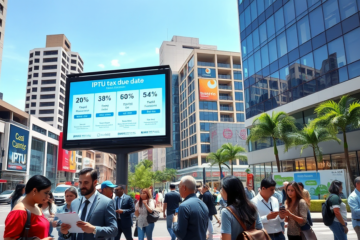Reorganize Your Finances With Your Tax Refund
Tax Refund is a valuable opportunity to reorganize personal finances.
In this article, we'll explore the best strategies for taking advantage of this refund, discussing the importance of paying off high-interest debts, such as overdraft and credit card debts, as well as investment options for those who are already debt-free.
We will also discuss the need to maintain an emergency fund and how the Tesouro Selic can be a profitable alternative.
Finally, we will emphasize the importance of using money wisely and planning your daily expenses.
Income Tax Refund as a Chance to Reorganize Finances
The Income Tax refund is a valuable opportunity that can be used to reorganize personal finances.
This moment is strategic, as the amount returned by the Federal Revenue Service represents an opportunity to adjust the budget to address financial issues.
Often, reimbursement can mean the relief needed to pay off high-interest debts, such as overdraft or credit card revolving debt, which have rates that can exceed 443.3% per year.
Choosing to eliminate these debts is one of the fundamental decisions, as it provides greater financial peace of mind in the short and long term.
However, the presence of other strategies should not be ruled out, such as directing the refund towards investments.
For those who are already financially sound, investing in an emergency fund or in the Tesouro Selic, which offers returns of around 15% per year, is highly recommended.
Furthermore, detailed and conscious planning of the use of these resources helps to avoid financial impulses, ensuring more effective budget management.
Therefore, when receiving your Income Tax refund, the choice of how to use it should be made with caution and responsibility, always aiming for more robust and sustainable financial health in the long term.
Consult sources such as YOU INC. can provide valuable tips for this challenging journey.
Fundamental Decisions for the Use of Money
Receiving your income tax refund opens the door to decisions that directly impact your financial health.
The taxpayer must consider whether the amount will be used to pay off onerous debts, to build wealth through investments, or to cover planned expenses that bring real benefits.
Below, each alternative will be explored in detail, highlighting its pros, cons and requirements for a responsible choice.
Priority in Paying Off High-Interest Debts
Eliminating overdraft and revolving credit card debt should be a priority.
These types of credit are known for offering extremely high interest rates, which can lead to a cycle of debt that is difficult to reverse.
The interest of the special check can reach up to 347,4% per year, while the credit card revolving credit can reach up to 443,3%, according to the table below.
| Debt | Annual Fee |
|---|---|
| Special Check | 347,4% |
| Card Revolving | 443,3% |
Paying off these debts reduces financial pressure and frees up resources for other needs, preventing high interest rates from consuming a large portion of income.
Proper financial planning allows you to prioritize the payment of these debts and avoid new loans to cover old debts.
For more details on official rates, please consult information directly from Central Bank of Brazil.
Additionally, negotiating payment terms with your bank can ensure a reduction in fees and, consequently, the total amount due.
Avoiding or eliminating these debts guarantees greater peace of mind and control over your financial life.
Recommended Investments for Those Without Debt
For investors who are debt-free, direct the refund of Income Tax for a emergency reserve is an essential strategy.
This reserve acts as a financial cushion designed to cover unexpected expenses, providing significant security in times of uncertainty.
In times of economic crisis or personal unforeseen circumstances, having this reserve can prevent the need to resort to high-interest emergency loans.
Another highly recommended option is to invest in Selic Treasury.
This is a federal public security, offered by the government, recognized for its security and liquidity (ease of redemption).
With a profitability of around 15% per year, the Selic Treasury offers a valuable combination of security and a decent return on investment. It is an alternative ideal for those who wish to preserve capital while waiting for riskier investment opportunities.
A daily liquidity and the guarantee of the National Treasury make this security a solid choice, allowing investors to have easy access to their money whenever necessary, effectively strengthening their financial health.
Conscious Use of Money and Spending Planning
Conscious consumption is becoming increasingly relevant in times of uncertain finances.
With the real need in mind, it is crucial that consumers plan and make financial choices focused on sustainability and budget control.
This not only helps preserve personal wealth, but also creates a positive social impact by preventing rampant consumerism.
Mindless consumerism often results in debt, financial stress, and eventually a lower quality of life.
A practical approach can start with developing a detailed financial plan.
Incorporating tools like finance tracking apps or spreadsheets can make budget management easier.
Implementing practical tips in your daily life is essential:
- Avoid impulse purchases;
- Set priorities according to your needs;
- Always keeping an eye on regular expenses;
- Set and respect consumption limits.
With these practices, it is possible to obtain a financial control more effective and ensure a conscious use of Income Tax, as suggested by various planning strategies available on the internet.
This not only helps individual well-being but also encourages sustainable practices on a broader scale.
Detailed Personal Budget Assessment
To ensure that the application of the Income Tax refund is carried out effectively, it is crucial start with a detailed assessment of your personal budget.
The first step involves carefully recording all sources of income, such as salary, investment income, and other occasional earnings.
This process provides a clear view of your incoming cash flow and helps highlight any areas that may be underestimated.
At the same time, you should also list all expenses, both fixed, such as rent and utility bills, and variable, such as leisure and food.
This allows you to identify excesses and areas where savings can be made, facilitating more balanced financial management.
Keeping this documentation up to date is essential for financial health.
This control not only avoids the temptation to use the refund thoughtlessly, but also contributes to more robust long-term planning.
A organization Financial management, through the recording of income and expenses, becomes a valuable tool for more informed and strategic decisions, optimizing the use of refunds to pay off debts or invest intelligently.
For more tips on maximizing your refund, visit Santander guide.
Tax Refund could be the key to a healthier financial future.
By following these tips, you'll be on the right track to ensuring your money works smartly and efficiently, helping you achieve your financial goals.



0 Comments